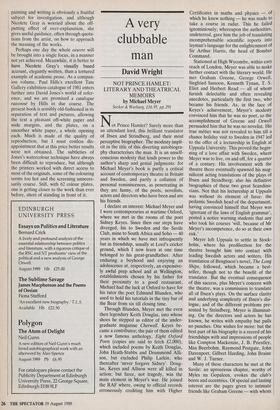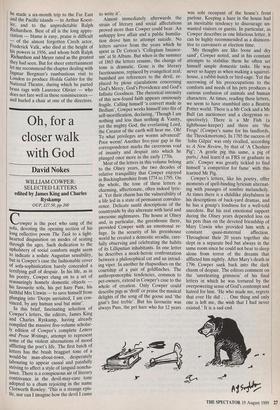A very clubbable man
David Wright
NOT PRINCE HAMLET: LITERARY AND THEATRICAL MEMOIRS by Michael Meyer
Secker & Warburg, £16.95, pp.291
Not Prince Hamlet? Surely more than an attendant lord, this brilliant translator of Ibsen and Strindberg, and their most perceptive biographer. The modesty impli- cit in the title of this diverting autobiogra- phy characterises the man. It is an unself- conscious modesty that lends power to the author's sharp and. genial judgments: for Michael Meyer's book is partly a critical account of contemporary theatre in Britain and Sweden, and partly a collation of personal reminiscences, as penetrating as they are funny, of the poets, novelists, actors and directors who have been and are his friends.
I declare an interest: Michael Meyer and I were contemporaries at wartime Oxford, where we met in the rooms of the poet Sidney Keyes. Since then our steps have diverged, his to Sweden and the Savile Club, mine to South Africa and Soho —40 years in which we have met infrequently but in friendship, usually at Lord's cricket ground, which I now learn at one time belonged to his great-grandfather. After enduring- a boyhood and enjoying an adolescence at, respectively, an expensive- ly awful prep school and at Wellington, establishments chosen by his father for their proximity to a good restaurant, Michael had the luck at Oxford to have for his tutor the poet Edmund Blunden, who used to hold his tutorials in the tiny bar of the Bear from six till closing time.
Through Blunden, Meyer met the even then legendary Keith Douglas, into whose shoes he stepped as editor of the under- graduate magazine Cherwell. Keyes be- came a contributor; the pair of them edited a now famous anthology, Eight Oxford Poets (copies are said to fetch £2,000), which included poems by Keith Douglas, John Heath-Stubbs and Drummond Alli- son, but excluded Philip Larkin, who thereafter 'never forgave Sidney'. Doug- las, Keyes and Allison were all killed in action; but farce, not tragedy, was the main element in Meyer's war. He joined the RAF where, owing to official records erroneously crediting him with Higher Certificates in maths and physics — of which he knew nothing — he was made to take a course in radar. This he failed ignominiously; whereupon the authorities, undeterred, gave him the job of translating incomprehensible scientific reports into layman's language for the enlightenment of Sir Arthur Harris, the head of Bomber Command.
Stationed at High Wycombe, within easy reach of London, Meyer was able to make further contact with the literary world. He met Graham Greene, George Orwell, Siegfried Sassoon, Kenneth Tynan, T. S. Eliot and Herbert Read — all of whom furnish delectable and often revealing anecdotes, particularly the first two, who became his friends. As, in the face of Keyes's achievement, Meyer's modesty convinced him that he was no poet, so the accomplishment of Greene and Orwell persuaded him that he was no novelist. His true metier was not revealed to him till a chance holiday visit to Sweden in 1947 led to the offer of a lectureship in English at Uppsala University. This proved the begin- ning of a love affair with Sweden, where Meyer was to live, on and off, for a quarter of a century. His involvement with the theatre there eventually spawned his mag- nificent acting translations of the plays of Ibsen and Strindberg; also his definitive biographies of these two great Scandina- vians. Not that his lectureship at Uppsala was without its element of farce: the pedantic Swedish head of the department, having convinced himself that Meyer was `ignorant of the laws of English grammar', posted a notice warning students that any who took his courses 'will, because of Mr Meyer's incompetence, do so at their own risk.'
Meyer left Uppsala to settle in Stock- holm, where his predilection for the theatre brought him into contact with leading Swedish actors and writers. His translation of Bengtsson's novel, The Long Ships, followed, which became a best- seller, though not to the benefit of the translator. But the eventual consequence of this success, plus Meyer's concern with the theatre, was a commission to translate all of Ibsen's plays. On the surface clarity and underlying complexity of Ibsen's dia- logue, and of the different problems pre- sented by Strindberg, Meyer is illuminat- ing. On the directors and actors he has known, he writes with empathy but pulls no punches. One wishes for more: but the best part of his biography is a record of his friendships with and impressions of people like Compton Mackenzie, J. B. Priestley, Max Beerbohm, Raymond Postgate, John Davenport, Gilbert Harding, John Braine and W. J. Turner.
Many of these characters he met at the Savile: an uproarious chapter, worthy of Myles na Gopaleen, evokes the club's bores and eccentrics. Of special and lasting interest are the pages given to intimate friends like Graham Greene — with whom he made a six-month trip to the Far East and the Pacific islands — to Arthur Koest- ler, and to the unpredictable Ralph Richardson. Best of all is the long appre- ciation — blame is easy, praise is difficult — of the almost forgotten Czech actor, Frederick Valk, who died at the height of his powers in 1956, and whom both Ralph Richardson and Meyer rated as the greatest they had seen. But for sheer entertainment let me recommend the chapter dealing with Ingmar Bergman's rumbustious visit to London to produce Hedda Gabler for the National Theatre, during which he parted brass rags with Laurence Olivier — who does not fare well in these reminiscences— and hurled a chair at one of the directors.



















































 Previous page
Previous page